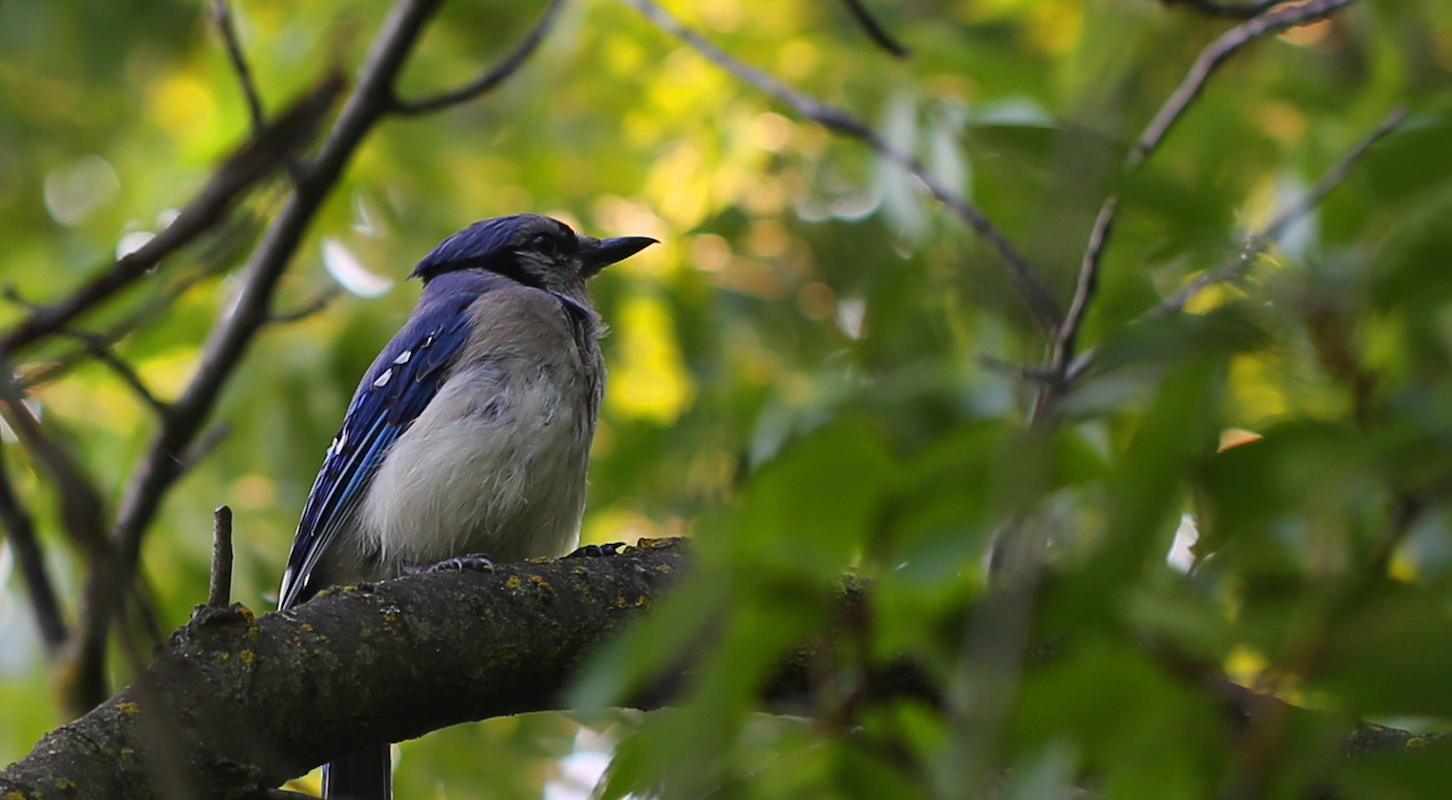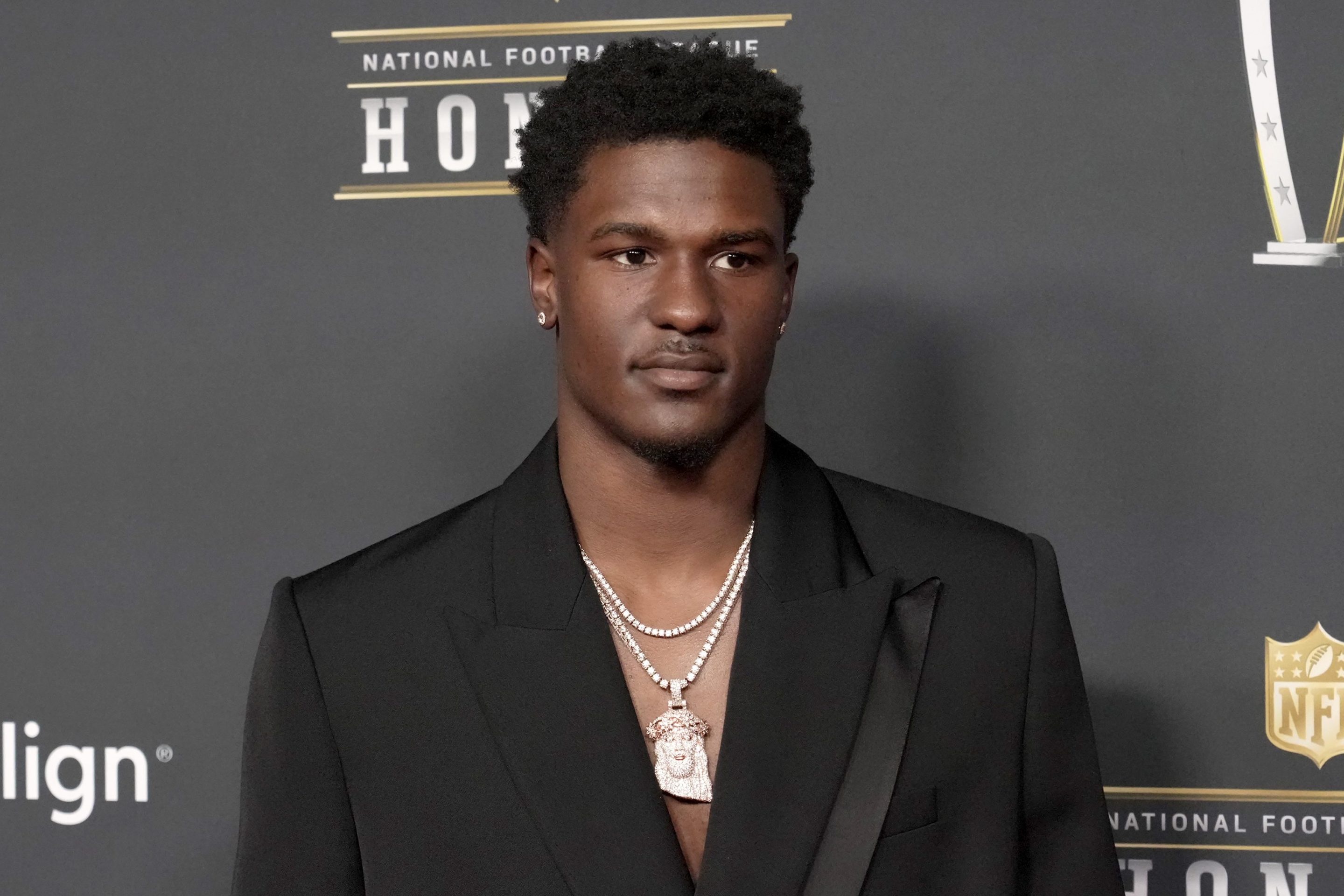Welcome to Margin of Error, a new politics column from Tom Scocca, editor of the Indignity newsletter, examining the apocalyptic politics and coverage of Campaign 2024.
Late last week, in the middle of a snow shower, I heard a country sound in the city: the clapping and rustling of a whole mixed flock of birds scattering in terror. Out the bedroom window, on a high branch above the back gardens, was a big juvenile Cooper's Hawk, puffed up against the cold so it almost looked like a red-tail. Its tail was long and barred, though, and it glared around with that accipitrine bloodthirst no red-tail is mean enough to match.
The hawk dropped to a lower perch, tucked away under some evergreen branches, and hunkered down there, its brown parts brown as a tree trunk, its white parts like bits of snow. I knew exactly where it was, and each time I checked the window, I still had trouble picking it out. The scene remained that way for a long time, in the blowing snow.
Now and then a blue jay would set up well above the hawk and at a distance, with a clear line of sight, and would lean down toward it like a pointer dog and start screaming: Hey! Hey! Hey, you fucker! Hey! Goddamn hawk! Hey! Sometimes another blue jay would second it, but that was all. They never managed to summon the kind of blue jay mob that gets mad and bold enough to start dive-bombing a raptor and run it right out of the neighborhood.
In one of the interludes when the blue jay took a break, a mourning dove blundered into the back, oblivious to the eerie emptiness around it. It figured it out soon enough, though, and froze near the top of the tallest tree: too far away for the hawk to swoop at it, too scared to move. It was stuck there, truly stuck. It didn't have the rage and agility of the blue jays to allow it to come and go. It was just a mourning dove, softest of birds; I've never seen a mourning dove even scuffle with another mourning dove. For at least 45 minutes, maybe a full hour, every time I looked out the window the dove was trapped, helpless, in the exact same place—aware of the danger, and unable to do anything about it.
I'm not a trained augur, but the portents in this seemed pretty easy to read. Certainly the hawk scenario was clearer and better-focused than the election coverage coming out of New Hampshire. There, the press was reporting the progress toward primary day as a series of dramatic horse-racing maneuvers, with Nikki Haley spurring her campaign toward the opening on the rail created by Ron DeSantis's decision to drop out. Maybe, in a two-way race, she could rouse enough independents to push her ahead of Donald Trump. Maybe the support of New Hampshire's anti-Trump Republican governor could energize the less MAGA elements of the state party. Maybe—
Maybe not. Certainly not. Unquestionably: nope.
The paradox of the 2024 presidential race is that everybody already knows exactly what's going to happen, and nobody is prepared to even imagine the things that could happen. Donald Trump has been the Republican nominee, for all functional purposes, since Feb. 13, 2021, when 43 Republican senators voted to acquit him in his impeachment trial for inciting the January 6 attack on the Capitol. Joe Biden effectively became the Democratic nominee the same day, when his party began to realize that rather than possibly transitioning to a post-Trump era under a caretaker presidency, the Democrats were going to have to send their winner back out for a rematch with Trump.
A rematch is not a rerun, though. Politics coverage in this country generally operates on the assumption that each election is basically the same thing as every other election. The candidates campaign, the press interprets, the public responds. But nothing even remotely like Biden–Trump 2 has ever taken place in American history.
There's no public-opinion model for what happens when a candidate faces multiple ongoing criminal prosecutions across multiple jurisdictions—including charges brought on by his efforts to forcibly steal the previous election. There's no established analytic scheme that covers the degree of abuse, intimidation, and ratfuckery that will be directed against the people, institutions, and mechanisms handling the vote. There's no precedent for the legal and constitutional wrangling over whether Trump is even eligible for office.
And no one—absolutely no one, anywhere—is prepared for the possibility that either one of these extremely elderly, otherwise inevitable candidates drops dead, or becomes visibly, seriously debilitated, before Election Day. Most Americans were not even alive the last time a party political convention had to choose a candidate. Now there's a real chance that one of these weird and boring telethons could be forced to become the actual mechanism for carrying out an emergency nomination.
Why not look at the birds (or tea leaves, or intestines) for insight? The certified professionals are guessing and making it up as they go along, at best. At worst, they're telling the same stories they've always told, as if this election were one more chapter in an unbroken tale of the peaceful transfer of power. Last time around, people died in the Capitol, Congress dropped the electoral count and ran for shelter, and the Speaker of the House ended up taking command of the armed forces.
And this time around, so far, we got a year's worth of candidate-on-the-rise hype stories and debate reviews and insider accounts of strategy and spending on the campaign trail—a campaign trail that led to Trump, four days before he easily won New Hampshire, rambling into the cameras and microphones at a rally about how Nikki Haley had been in charge of security at the Capitol during the January 6 attack. It was his usual spiel about Nancy Pelosi, warped around an entirely different enemy until it was genuinely, indisputably nonsense.
The New York Times subheadline on the news gently but inaccurately wrote that Trump had "inexplicably substituted Nikki Haley’s name for Ms. Pelosi’s." It did not seem particularly inexplicable, and the Times itself tiptoed up to the explanation: "Mr. Trump, 77, often attacks President Biden, 81, over his age and suggests that Mr. Biden is mentally unfit for office"—a remarkable combination of the standard "critics say" approach of the Times with Trump's own "many people are saying" device, all applied with the backhand.
Saturday, the Times liveblogged Haley's almost-amplification of the line of attack:
In a news conference with reporters after her campaign event in Peterborough, N.H., Ms. Haley stopped short of calling Mr. Trump mentally unfit. But she did question whether he would be “on it” enough to lead the nation.
“My parents are up in age, and I love them dearly,” she said. “But when you see them hit a certain age, there is a decline. That’s a fact—ask any doctor, there is a decline.”
New York Times
In a different world, that decline would matter. In this one, it was a strange, brief intrusion of reality into a storyline that depended on the unreal. The Haley campaign was—is, if she sincerely means to stick with it until Trump crushes her in South Carolina—a work of speculative fiction, a tale from an alternative history in which the Donald Trump phenomenon could simply go away. What would that be like? Haley was the avatar of an imaginary Republican Party, one in which a person could serve two years under Trump and come away as their own person, untainted and unconstrained, ready to lead the country in a new direction. She was role-playing a candidacy, and the press was role-playing its coverage.
"The energy inside the ballroom where Haley is speaking is absolutely electric," the Times election liveblog reported early Tuesday evening. Here was the sort of thing you might hear from the front lines of a real political contest, a glimpse at a new possible future. By Wednesday, the URL on the post redirected to the main blog, whose lead item described Trump as "[b]rushing aside Nikki Haley a little over a week after he steamrolled her and Ron DeSantis in Iowa." It was as if the electric moment had never even happened.






